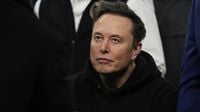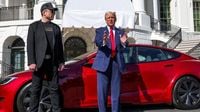Tesla, the electric vehicle pioneer, has caught investors off guard with disappointing first-quarter results for 2025, revealing significant declines in revenue and profits. Following a model change and controversies surrounding CEO Elon Musk's political involvement, the company faces critical questions about its future.
According to the quarterly report released on April 22, 2025, after the U.S. stock market closed, Tesla's revenue fell by 9 percent year-on-year to approximately $19.3 billion, significantly below analysts' expectations of around $21.5 billion. The adjusted net profit plummeted by a staggering 71 percent, amounting to just $409 million, or $0.27 per share, while the market had anticipated earnings of $0.39 per share.
Deliveries of Tesla vehicles also took a hit, dropping 13 percent to 336,681 units in the first quarter. This decline can be attributed to several factors, including a shift to a new generation of the popular Model Y, which led to production pauses and reduced buyer incentive for the previous version. Additionally, Tesla's automotive division saw a more alarming 20 percent decrease in revenue.
As a response to these challenges, Musk announced that he would withdraw from his role as a cost-cutter for President Donald Trump, focusing more on Tesla's operations starting in May 2025. While he plans to dedicate one to two days per week to governmental tasks, his commitment to Tesla has raised hopes among investors. Musk stated, "The critical work at DOGE is largely done," referring to the Department of Government Efficiency, where he has been involved.
Despite the bleak financial outlook, Musk remains optimistic about Tesla's future. He reiterated plans to produce more affordable vehicle models starting in the first half of 2025 and confirmed the production of a robotaxi without a steering wheel and pedals, set to begin in 2026. These announcements come amid a backdrop of increasing uncertainty in the auto and energy markets, which Tesla has acknowledged in its report.
Analysts have expressed concern over Musk's political activities and their impact on Tesla's brand. Dan Ives of Wedbush Securities, who has historically been bullish on Tesla, estimates that Musk's actions could permanently depress demand for the company’s vehicles by 15 to 20 percent. The backlash against Musk’s close association with Trump, including over $250 million in campaign donations, has led to protests and boycotts that have further complicated Tesla's market position.
During the earnings call, Musk defended his political role, asserting that the protests against him were orchestrated by those benefiting from waste and fraud in government spending. He emphasized the importance of addressing these issues for the benefit of Tesla and the nation as a whole, stating, "If America goes down, we all go down, including Tesla."
In light of the disappointing results, Tesla has retracted its growth forecast for 2025, a move that has alarmed many investors. The company's operating profit margin has also tightened, falling to just 2.1 percent compared to 5.5 percent the previous year. The decline in vehicle sales has been compounded by aggressive discounting strategies that have hurt profitability.
However, there were some bright spots in Tesla's financial report. The energy generation and storage division experienced a remarkable 67 percent increase in revenue, contributing $2.7 billion to the overall figures. This sector's stability is crucial for balancing out the downturn in automotive sales, especially as demand for energy storage solutions grows.
Looking ahead, the anticipation surrounding the launch of new, more affordable Tesla models and the robotaxi service remains high. The company aims to leverage existing production lines to minimize costs, a strategy that could prove beneficial in a competitive market. Nevertheless, uncertainties surrounding trade policies and Musk's political affiliations continue to loom large over Tesla's prospects.
As the electric vehicle market becomes increasingly competitive, with rivals like BYD making significant strides, Tesla's ability to innovate and adapt will be critical. The company still holds a commanding market capitalization of over $750 billion, but investor confidence has been shaken by the recent financial disclosures.
In the wake of the earnings report, Tesla's stock showed signs of recovery, gaining approximately 4 percent in after-hours trading. Investors reacted positively to Musk's commitment to refocus on Tesla, indicating that there is still substantial faith in his leadership capabilities.
Ultimately, while Tesla faces a challenging environment marked by declining sales and profits, the company's future hinges on its ability to navigate these obstacles and capitalize on emerging opportunities in the electric vehicle and energy sectors.










